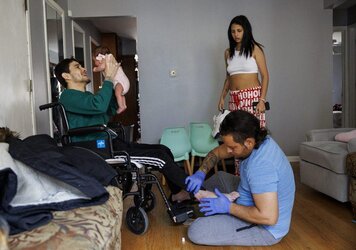 Genesis Chacon watches as Jefferson Cañizalez cleans a wound on her husband’s foot, while Marilieser Gil-Blanco holds their 1-month-old daughter Ashley in their home in Chicago’s Chatham neighborhood on Feb. 6, 2024. Gil-Blanco lost the ability to walk from a rare spinal condition on the journey from Peru to the U.S. His cousin Cañizalez traveled from Venezuela in January to help care for him. (Armando L. Sanchez/Chicago Tribune)
Genesis Chacon watches as Jefferson Cañizalez cleans a wound on her husband’s foot, while Marilieser Gil-Blanco holds their 1-month-old daughter Ashley in their home in Chicago’s Chatham neighborhood on Feb. 6, 2024. Gil-Blanco lost the ability to walk from a rare spinal condition on the journey from Peru to the U.S. His cousin Cañizalez traveled from Venezuela in January to help care for him. (Armando L. Sanchez/Chicago Tribune)
Genesis Chacon was pregnant when she essentially carried her husband and toddler across countries to get to Chicago.
Her healthy, able-bodied husband became paralyzed from the chest down due to a rare condition he developed while on their journey to the United States last summer. Now, the 22-year-old mother from Venezuela tends to his every need — even as she recovers from a C-section she had four weeks ago to deliver their daughter.
Instead of recuperating with light activity as strongly recommended by doctors, Chacon is carrying her husband’s wheelchair up and down the stairs of their apartment, cleaning his gaping bedsores and changing his underpads — on top of caring for their newborn and 4-year-old daughter.
The city had resettled the family Jan. 28 into a second-floor apartment in Chatham. Isolated inside with all her responsibilities, Chacon learned Tuesday that city officials at the Inn of Chicago in Streeterville — where they’d been staying before being resettled — had thrown away the family’s immigration papers and their newborn daughter’s birth certificate, along with the rest of their belongings. The staff knew of the family’s dire circumstances.
“As per protocol staff gathered the rest of their belongings, labeled and stored them. Case management made them aware they will hold them for 48 hours,” said Cassio Mendoza, Mayor Brandon Johnson’s deputy press secretary, in a statement to the Tribune. “An extension was granted for a period of 72 more hours at which point the belongings were disposed of.”
As Chacon and her family just try to survive, they have no idea how they will recover what the city threw away.
“It’s been hard. At the shelter, we didn’t receive medicine or enough food,” Chacon said. “But thank God we’re not sleeping on the street.”
A call from the city
Her husband, Marilieser Gil-Blanco, 23, was sitting in his wheelchair at a Walgreens pharmacy when he learned shelter officials had thrown away their documents.
He had just left a doctor’s appointment, where he’d discussed next steps in the care plan for his condition of transverse myelitis — inflammation of the spinal cord. His symptoms include loss of movement in his legs and uncontrolled bowels.
 Jefferson Cañizalez pushes his cousin Marilieser Gil-Blanco to the Inn of Chicago migrant shelter on Feb. 6, 2024, after learning Gil-Blanco’s family’s belongings, including important immigration documents, were thrown away at the shelter. (Armando L. Sanchez/Chicago Tribune)
Jefferson Cañizalez pushes his cousin Marilieser Gil-Blanco to the Inn of Chicago migrant shelter on Feb. 6, 2024, after learning Gil-Blanco’s family’s belongings, including important immigration documents, were thrown away at the shelter. (Armando L. Sanchez/Chicago Tribune)
“
You had 48 hours,” a woman’s voice said over a WhatsApp call.
“You never told me we had 48 hours,” he said, addressing the woman by name. “All of my stuff was there. My daughter’s birth certificate. My wife’s immigration papers. How can you have just thrown it all away? I don’t understand.”
“
Because enough days had passed since you left,” the voice responded.
“I told you. … You knew what my situation was,” he said.
“
Yes, I know your situation,” she said. “
I don’t have control. We received instructions to remove them.”
“How could you? The birth certificate? The immigration papers?”
“
We need to be responsible. We’re all adults,” a man’s voice came through the phone.
“Of course, we’re all adults here. But you can’t throw away our stuff like that,” he said.
“
We warned you,” the man said.
“When did you call me? At what point did you call me?” Gil-Blanco’s voice cracked as he addressed the woman by name again. “Can you check to see if the papers are under the mattress?”
 Marilieser Gil-Blanco talks on the phone Feb. 6, 2024, after learning his families belongings, including his wife’s immigration papers and his newborn daughter’s U.S. birth certificate, were thrown away at the Inn of Chicago migrant shelter. (Armando L. Sanchez/Chicago Tribune)
Marilieser Gil-Blanco talks on the phone Feb. 6, 2024, after learning his families belongings, including his wife’s immigration papers and his newborn daughter’s U.S. birth certificate, were thrown away at the Inn of Chicago migrant shelter. (Armando L. Sanchez/Chicago Tribune)
In the city’s statement to the Tribune, Mendoza said shelter staff members did search for the paperwork.
“Upon returning to the shelter on 2/6, Mr. Gil-Blanco informed shelter staff that his leftover belongings included important documentation. Shelter staff conducted a thorough search of his former room and reached out to housekeeping staff in an effort to recover the documents,” he said. “Unfortunately, the documents were in a nondescript black bag and the staff do not recall seeing it.”
Transverse myelitis
Gil-Blanco came to Chicago with his pregnant wife for better economic opportunities and resources. Like many migrants, the couple left their home country of Venezuela in 2017 and spent time in Colombia and Peru before deciding to trek through eight countries to the United States with their daughter, Mila.
“There are days that I’m happy,” Gil-Blanco told the Tribune. “Then there are days when I am angry, upset.”
Unable to move, he passes time in bed thinking about how he used to be active: carrying his 4-year-old daughter, selling fruit and chicken in markets, walking around taking portraits on his camera.
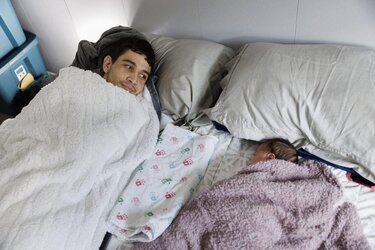 Marilieser Gil-Blanco lies in bed with his newborn daughter, Ashley, on Jan. 31, 2024. Gil-Blanco lost the ability to walk from a rare spinal condition on the journey to the U.S. (Armando L. Sanchez/Chicago Tribune)
Marilieser Gil-Blanco lies in bed with his newborn daughter, Ashley, on Jan. 31, 2024. Gil-Blanco lost the ability to walk from a rare spinal condition on the journey to the U.S. (Armando L. Sanchez/Chicago Tribune)
They came to the United States so Gil-Blanco could work. But now he needs his wife to turn him over in bed.
Experts don’t know the exact cause of transverse myelitis, a rare neurological condition that happens when someone’s spinal cord becomes inflamed. If oxygen can’t reach the spinal cord, nerve cells often start to die. The dying tissue can cause the inflammation, which can lead to multiple disabilities including paralysis.
According to Johns Hopkins Medicine, some patients make a partial or full recovery from transverse myelitis, but about one-third have significant physical disabilities — like Gil-Blanco.
His wife obsessively looks up his chances of recovery.
Since Gil-Blanco received his diagnosis, his skin has grown pale, and he’s dropped considerable weight. There are seven gaping sores on his body — on his side, below his leg, on his spine, his ankles.
“Yesterday, he threw up a lot. Today he’s a bit better,” said Chacon as she helped him dress for a doctor’s appointment at Northwestern Memorial Hospital.
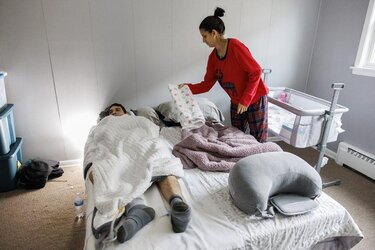 Genesis Chacon places a blanket next to her husband, Marilieser Gil-Blanco, while he lies in bed next to their 1-month-old daughter, Ashley, at their home in Chicago’s Chatham neighborhood on Jan. 31, 2024. (Armando L. Sanchez/Chicago Tribune)
Genesis Chacon places a blanket next to her husband, Marilieser Gil-Blanco, while he lies in bed next to their 1-month-old daughter, Ashley, at their home in Chicago’s Chatham neighborhood on Jan. 31, 2024. (Armando L. Sanchez/Chicago Tribune)
Chacon gave birth to their daughter Ashley on Jan. 10. A nurse suggested the name, which they liked because it sounded American.
Doctors recommend that after a C-section, a woman should limit activity and rest for at least a month, sometimes longer, so the incision through her abdomen and uterus can heal. They’re instructed to not lift anything heavier than the baby.
Chacon, however, has had no choice but to push her body to take care of her husband.
She is not trained in wound care but has learned how to apply collagenase ointment to her husband’s sores. She’s learned how to use his catheter and maneuver a wheelchair.
She closely monitors his condition — as closely as she monitors her newborn’s.
Physical therapy is an important part of treatment for myelitis, but sessions are expensive and Gil-Blanco doesn’t have insurance.
Because he hasn’t received the care he needs, he is developing more bedsores. Every day he doesn’t get therapy, his chances of walking again decrease.
The Inn of Chicago
The Tribune first met Chacon before Christmas as she begged for money while her husband lay in bed at the Inn of Chicago. She sat outside a storefront with her swollen belly and toddler, carrying a cardboard sign.
“Hello, we are Venezuelan family, could you help us with whatever comes from your heart, it will be very helpful to us, thank you, God bless you,” the sign read in green marker.
“My husband doesn’t leave our room,” she told the Tribune then. “No one is helping us.”
 Genesis Chacon holds her 1-month-old daughter, Ashley, in their home in Chicago’s Chatham neighborhood on Feb. 6, 2024. Chacon was pregnant when she left Peru in June with her husband and their 4-year-old daughter. (Armando L. Sanchez/Chicago Tribune)
Genesis Chacon holds her 1-month-old daughter, Ashley, in their home in Chicago’s Chatham neighborhood on Feb. 6, 2024. Chacon was pregnant when she left Peru in June with her husband and their 4-year-old daughter. (Armando L. Sanchez/Chicago Tribune)
Chacon said the shelter staff had not addressed her husband’s medical needs during that time.
She would wheel him to his doctor’s appointments at Northwestern, a few blocks from the shelter.
Mendoza, the city’s spokesperson, said Gil-Blanco had been connected directly to health care services but would not comment on specific care that individuals in the shelter system receive “out of respect to their privacy rights.”
Trinh Truong, a policy analyst with the Center for American Progress, said immigrants with disabilities face unique challenges finding the resources to receive short- or long-term care.
“This can lead to severe and life-threatening complications and situations,” she said.
Since August 2022, Chicago has received more than 35,000 migrants, mostly from Venezuela, and the city has struggled to house them. As of last week, about 13,000 migrants were housed in 28 shelters managed by the city and state.
A sharp pain in his back
Chacon said her husband first showed symptoms of transverse myelitis at a house in Mexico City in late July. He had a sharp pain in his back that didn’t go away. They checked him into the hospital, and he was given a shot for the pain.
A few hours later, the pain came back worse. He lost feeling in his feet, then his legs. Then he couldn’t walk.
“I remember taking a shower and changing the water temperature from hot to cold and hot to cold,” he said. “I felt nothing.”
 Marilieser Gil-Blanco winces as he lies in bed at home in the Chatham neighborhood on Jan. 31, 2024. Gil-Blanco lost the ability to walk from a rare spinal condition on the journey to the U.S. (Armando L. Sanchez/Chicago Tribune)
Marilieser Gil-Blanco winces as he lies in bed at home in the Chatham neighborhood on Jan. 31, 2024. Gil-Blanco lost the ability to walk from a rare spinal condition on the journey to the U.S. (Armando L. Sanchez/Chicago Tribune)
He was in and out of the hospital for weeks in Mexico, eventually falling into a coma. He went into cardiac arrest four times.
“We thought at the time it might have been caused by our time in the jungle,” said Chacon, referring to the Darién Gap between Colombia and Panama that thousands of migrants in Chicago have crossed over the past year to make it to the United States.
Doctors in Mexico didn’t think he would survive, she said, but after three days Gil-Blanco awoke from his coma and was able to leave the hospital.
Desperate for help, Gil-Blanco and his wife decided to cross the Rio Grande from Matamoros, Mexico, to Brownsville, Texas, in late September. To cross the rushing water, he sat on an inflatable mattress they made into a chair. Their daughter Mila went with them. Gil-Blanco almost drowned.
After they arrived in Texas, Chacon and Mila were offered a free plane ticket to Chicago by staff at a shelter. Gil-Blanco stayed behind in the Brownsville hospital for longer, over a week.
He said a friend he’d made at the hospital gave him $100 for a bus ticket to Chicago. The trip took five days.
“That was really difficult,” he said. “I needed to change my diaper. No one helped me.”
Upon arriving in the sanctuary city in October, he reunited with his wife and daughter, and they were given housing at the Inn of Chicago.
‘Nobody was willing to help.’
The room at the Inn where the family stayed was tiny, Chacon said. She would wash her husband’s sores several times a day and turn him over in bed every hour. Her stomach grew bigger.
Chicagoan Renee DeTommaso was at Northwestern Memorial in early January with her father when she happened to sit next to Gil-Blanco and Chacon as they waited for treatment.
 Marilieser Gil-Blanco, center, waits with his cousin Jefferson Cañizalez for a medical appointment at Northwestern Memorial Hospital on Feb. 6, 2024, in Chicago. (Armando L. Sanchez/Chicago Tribune)
Marilieser Gil-Blanco, center, waits with his cousin Jefferson Cañizalez for a medical appointment at Northwestern Memorial Hospital on Feb. 6, 2024, in Chicago. (Armando L. Sanchez/Chicago Tribune)
She remembered his catheter was leaking on the ground. She was immediately drawn to the man in the wheelchair and his pregnant wife — their daughter running around, her curls bouncing.
DeTommaso asked them where they had come from and why they were there. She bought them some bread.
“My heart just broke for them,” she said.
The day before Chacon gave birth, DeTommaso pushed Gil-Blanco three blocks in the rain from the shelter to Northwestern to be by his wife’s side.
“Nobody was willing to help,” she said. “She was going into labor.”
Chacon called DeTommaso a “beautiful person.” The young Venezuelan mother gave birth through C-section, and immediately afterward, Gil-Blanco was hospitalized again.
Chatham
Staff members at the shelter found the family an apartment in Chatham. The couple received 90 days of rental assistance from the state-sponsored resettlement program. Their assistance began in January.
But their obstacles changed: The apartment had two flights of stairs and wasn’t wheelchair accessible. They had no furniture. And it took a month before their heat and electricity were turned on, said Emily Wheeler, program manager for the Faith Community Initiative, who is helping the family.
“They need a better, more accessible apartment so they can keep their heads above water while they’re healing,” she said.
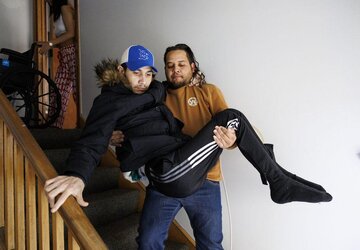 Jefferson Cañizalez carries his cousin Marilieser Gil-Blanco down a flight of stairs so Gil-Blanco can go to a medical appointment on Feb. 6, 2024. Cañizalez traveled from Venezuela in January to help care for Gil-Blanco. (Armando L. Sanchez/Chicago Tribune)
Jefferson Cañizalez carries his cousin Marilieser Gil-Blanco down a flight of stairs so Gil-Blanco can go to a medical appointment on Feb. 6, 2024. Cañizalez traveled from Venezuela in January to help care for Gil-Blanco. (Armando L. Sanchez/Chicago Tribune)
Daisy Contreras, a spokesperson for the Illinois Department of Human Services, said each tenant must sign a form saying they have spoken to the landlord, have seen the unit and agree it meets their needs. “In this case, we can share that prior to signing the lease, the family was aware there were two sets of stairs to get into the apartment,” Contreras said.
But volunteers said Chacon had only seen a video of the unit before moving and was surprised to see the steep staircase when they got there.
DeTommaso rented a truck to help move them Jan. 28. She and other volunteers secured furniture and helped bring it up the stairs. They bought them groceries and other necessities.
The couple left clothes and their paperwork in their room at the Inn for safekeeping until they were settled. But Chacon barely left the apartment after they arrived. She feels unsafe to walk around the neighborhood.
“People say it’s violent around here,” said Chacon.
An appointment
Gil-Blanco’s cousin Jefferson Cañizalez, 37, arrived in Chicago shortly after Ashley was born, to help with Gil-Blanco’s needs. This has slightly eased Chacon’s responsibilities.
The morning of his cousin’s doctor appointment, Cañizalez rolled Gil-Blanco out of their room in a wheelchair, and put bandages on his ankles.
Though he’s lost all movement below his waist, Gil-Blanco is still able to move his head and arms. He held Ashley up in the air and scrunched up his face. “My princess,” he said, flashing braces as he smiled.
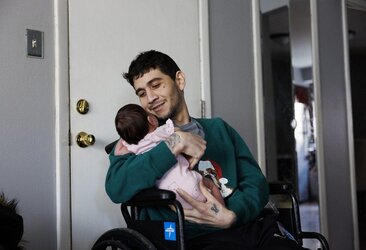 Marilieser Gil-Blanco holds his 1-month-old daughter, Ashley,in their home in the Chatham neighborhood of Chicago on Feb. 6, 2024. (Armando L. Sanchez/Chicago Tribune)
Marilieser Gil-Blanco holds his 1-month-old daughter, Ashley,in their home in the Chatham neighborhood of Chicago on Feb. 6, 2024. (Armando L. Sanchez/Chicago Tribune)
Cañizalez picked Gil-Blanco up and brought him down the stairs of the apartment. Chacon brought the wheelchair. It thudded against each of the 11 stairs as she struggled to hold its weight.
The men got into a white van the hospital had arranged for transport, and Chacon stayed behind.
At the hospital, a doctor spent over an hour treating his wounds and re-wrapping his bandages. He received a list of prescriptions: ascorbic acid, calcium and zinc sulfate, among other pills and medications.
“I never thought I’d be a nurse, but I’m learning,” laughed Cañizalez, as he pressed the elevator button to take Gil-Blanco to the pharmacy at Walgreens.
Cañizalez then went to the Inn of Chicago to gather the belongings left behind. A few minutes later, Cañizalez called Gil-Blanco. Staffers at the Inn of Chicago had thrown away all of his things, Cañizalez said. Gil-Blanco’s face fell.
Gil-Blanco had received a text last week from the shelter staff that he needed to remove his belongings because another family was moving into their room, but he had called and asked for an extension.
On the verge of tears, Gil-Blanco called his wife and explained what had happened.
Cañizalez quickly wheeled Gil-Blanco back to the shelter to speak to the director. When they got there, they were told the director wasn’t available. Gil-Blanco wasn’t allowed to go past the entrance.
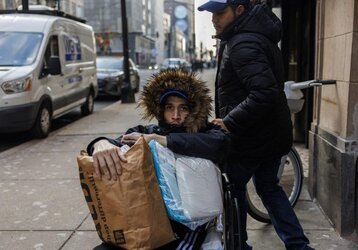 Jefferson Cañizalez, right, stands next to his cousin Marilieser Gil-Blanco after leaving the Inn of Chicago migrant shelter in Chicago on Feb. 6, 2024. Gil-Blanco learned the shelter threw away his family’s belongings, including his wife’s immigration papers and his newborn daughter’s U.S. birth certificate. (Armando L. Sanchez/Chicago Tribune)
Next steps
Jefferson Cañizalez, right, stands next to his cousin Marilieser Gil-Blanco after leaving the Inn of Chicago migrant shelter in Chicago on Feb. 6, 2024. Gil-Blanco learned the shelter threw away his family’s belongings, including his wife’s immigration papers and his newborn daughter’s U.S. birth certificate. (Armando L. Sanchez/Chicago Tribune)
Next steps
City officials say they have connected with the Illinois Migrant Council to work with Gil-Blanco over the next six months to obtain the paperwork that was discarded, but Chacon isn’t confident they’ll get their documents back. She doesn’t know what they will do after their rental assistance runs out.
The Faith Community Initiative and the Sanctuary Working Group are doing their best to get six months of rent together. They’re looking for affordable housing options to move the family in March.
Volunteers have set up a
GoFundMe to help the family.
Meanwhile, Chacon is worried about being able to pay for all their medical needs.
“Without a work permit, without being able to make money, it’s hard to afford it all,” she said.
Gil-Blanco and Chacon both say they find strength in their daughters. Gil-Blanco spends his days watching his newborn sleep. People say she looks just like him. He said she seldom cries.
His eldest daughter likes to pretend she’s a princess. She often runs around her father’s bed waving a magic wand.











































